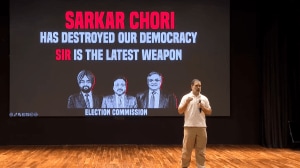Burmese refugees keep up vigil, bank on India
Thura has received a huge Internet bill for September. The reason: ever since the pro-democracy protests began in Burma...

Thura has received a huge Internet bill for September. The reason: ever since the pro-democracy protests began in Burma, the 44-year-old Burmese refugee has been downloading photos and video footage from various news and blog sites in an attempt to chronicle the protest. One wall of his two-bedroom apartment here is covered with black-and-white printouts of significant and outstanding photos of the protests and crackdown—bloodied monks, Nagai Kenji, streets strewn with slippers of fleeing protesters.
The apartment is also an office of the Burma Solidarity Front, and in an extended way, of the National League for Democracy that was in the forefront of the September protests. “I came here in 1988, after the crackdown on the protests then. Till the late ‘90s, our only income was Rs 2 per day from the Indian Government. Now, it’s been hiked to Rs 5. We have to collect it for a three-month period from the Chandel DC’s office. However, we get some monetary help from NGOs, which helps us carry on our work.”
Burmese refugees here, as in other parts of the country, are busy keeping abreast with the goings-on in Burma, passing on information coming from there over phone or via the Internet to NGOs, media and human rights groups, as well as coordinating solidarity protests.
According to him, the Internet has revolutionised the protests. “Not much may have changed in the two decades since I left Burma, but Internet has made all the difference. It has been possible to get a connection at home in Rangoon. That’s how most of the news has come out to the world. The Junta can’t control all the Internet traffic unless they shut it down. Since they use it too, it makes a total shutdown difficult,” he smiles.
A few more Burmese come in for a meeting, in which Thura gives them news updates from the Net, and also discusses plans for holding a solidarity protest in Churachandpur. “For the past thee days, every household in Burma has been lighting candles. They can’t hold a candlelight protest on the streets or there’ll be another crackdown. To express our solidarity with them, we are also lighting candles in our houses,” he says, as he lights three candles before a statue of the Buddha.
One of those attending the meeting says many student leaders arrested during the 1988 protests have been released, and they have also played important roles in the latest protests. “It would be good if the Indian Government would actively help us in establishing democracy in Burma. At the moment, they are very much in favour of the military Junta. When we arrived here, the Indian Government was strongly supporting Aung San Suu Kyi, but that has changed,” adds Thura.



- 01
- 02
- 03
- 04
- 05




























